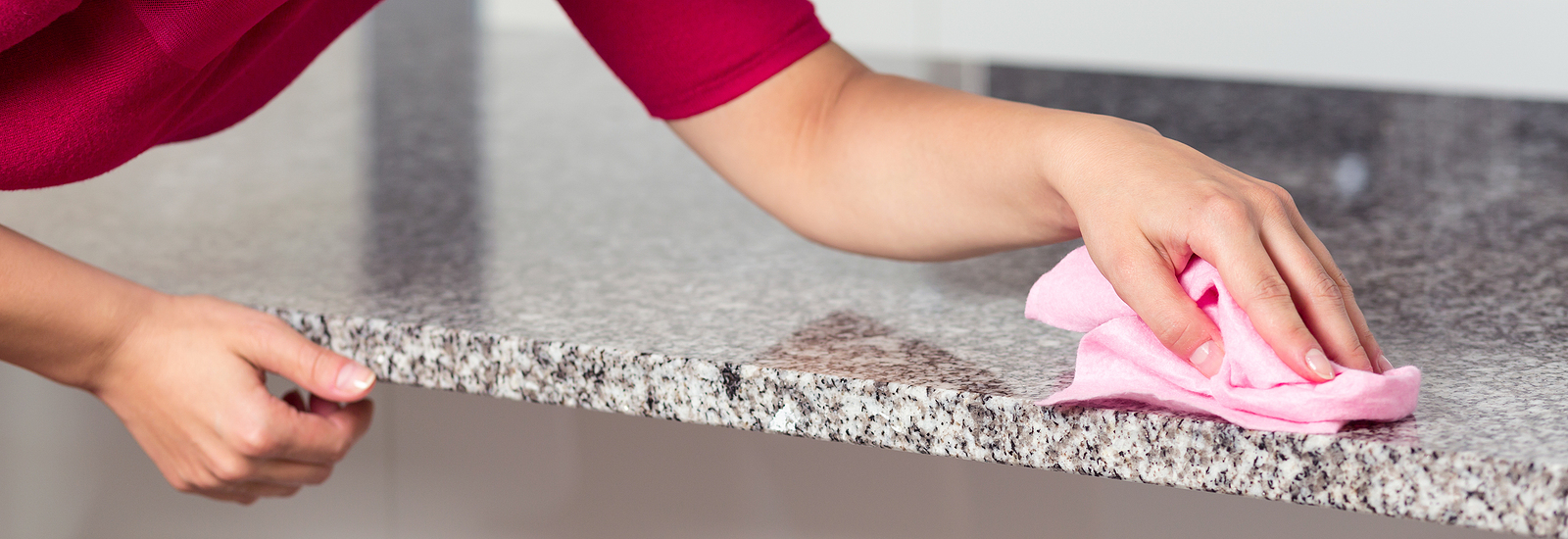
How to Clean Granite Countertops
Granite countertops are a popular choice for homeowners due to their durability, elegance, and natural beauty. To maintain their pristine condition, it is essential to know how to clean granite countertops properly. This comprehensive guide will walk you through the best methods for cleaning granite, including daily cleaning, deep cleaning, and removing stains. Follow these steps to keep your granite counters looking their best.
Daily Cleaning of Granite Countertops
For everyday granite countertop cleaning, you should:
- Gather your supplies – Before you begin, gather the necessary supplies. You will need a soft microfiber cloth, a spray bottle filled with warm water and a few drops of mild dish soap, and a dry, clean cloth.
- Wipe down the countertops – Spray the cleaning solution onto the granite countertops. Use a soft microfiber cloth to wipe the surface, removing any crumbs, dust, or light spills. Be sure to use gentle, circular motions to avoid scratching the surface.
- Rinse with water – After wiping the counters with the soapy solution, rinse the cloth with clean water. Wipe the countertops again to remove any soapy residue.
- Dry the surface – Use a dry, clean cloth to dry the granite surface thoroughly. This step is crucial as standing water can lead to water spots or damage over time.
Deep Cleaning Granite Countertops
For deeper cleaning, especially in high-use areas like kitchens, follow these steps once a week or as needed:
- Use a pH-balanced cleaner – Avoid acidic or abrasive cleaners as they can damage the sealant and the granite.
- Apply the cleaner – Spray the pH-balanced cleaner onto the granite countertops. Allow it to sit for a few minutes to loosen any stubborn grime or grease.
- Scrub gently – Using a soft sponge or microfiber cloth, gently scrub the surface in a circular motion. Focus on areas with visible dirt or grease buildup.
- Rinse and dry – Rinse the cloth with clean water and wipe the countertops to remove any cleaner residue. Dry the surface with a clean, dry cloth.
How to Clean Granite Stains
Despite regular cleaning, granite countertops can sometimes develop stains. Here’s how to clean different types of granite stains effectively:
Oil-Based Stains
Oil stains can come from cooking oils, butter, or greasy foods. To remove oil stains:
- Create a poultice – Mix baking soda and water to form a thick paste. Apply this paste directly to the oil stain.
- Cover and wait – Cover the paste with plastic wrap and let it sit for 24-48 hours. The baking soda will draw out the oil from the granite.
- Wipe and rinse – Remove the plastic wrap and wipe away the paste with a damp cloth. Rinse the area with water and dry it thoroughly.
Water Stains
Water stains are usually caused by mineral deposits left behind after the water evaporates. To clean water stains:
- Create a vinegar solution – Mix equal parts of vinegar and water in a spray bottle.
- Spray and scrub – Spray the solution on the water stain and scrub gently with a soft cloth.
- Rinse and dry – Rinse with water and dry the area thoroughly to prevent further water spots.
Food Stains
Food stains can result from spills of coffee, wine, or other colored liquids. To clean food stains:
- Get hydrogen peroxide – Dampen a cloth with hydrogen peroxide and place it on the stain.
- Cover and wait – Cover the cloth with plastic wrap and let it sit for a few hours.
- Wipe and rinse – Remove the plastic wrap, wipe the area, and rinse with water. Dry the countertop thoroughly.
Maintaining Granite Countertops
To keep your granite countertops in excellent condition, follow these maintenance tips:
- Seal the granite – Granite is a porous material and should be sealed to prevent stains. Check the sealant once a year. To test, sprinkle a few drops of water on the surface. If the water beads up, the seal is intact. If it absorbs, it is time to reseal.
- Avoid harsh cleaners – Never use bleach, ammonia, or acidic cleaners like vinegar or lemon juice. These can strip the sealant and damage the granite.
- Use cutting boards – Avoid cutting directly on the granite. Use cutting boards to prevent scratches and preserve the sealant.
- Wipe spills immediately – Granite can absorb liquids, leading to stains. Wipe up spills immediately, especially spills from acidic substances like wine, coffee, or citrus juices.
- Use coasters and trivets – Always use coasters under glasses and trivets under hot pots and pans. This prevents heat damage and water rings.
- Clean regularly – Regular cleaning prevents grime buildup and maintains the granite’s natural shine. Aim to clean your countertops daily and perform a deep clean weekly.
- Use granite polish – Occasionally polish your granite countertops to enhance their shine. Use a granite-safe polish and follow the manufacturer’s instructions.
- Avoid heavy impact – Granite is durable but can chip or crack under heavy impact. Be mindful of heavy objects and avoid dropping them on the countertops.
Get Granite Countertop Services
Knowing how to clean granite counters is vital for maintaining their beauty and longevity. If you need further assistance with granite countertops, Remodeling.com’s network of contractors can help. Contact us today to connect with experienced professionals who can provide expert care for your granite countertops and other home improvement needs.
